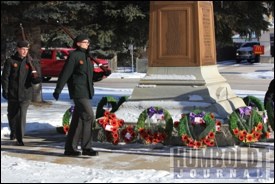It wasn't like any other day, but it never is. Humboldt was blanketed in pearls of white snow and the temperature was a little chilly, but kids weren't outside making snowmen. The lineup at the Tim Hortons drive-thru was peculiarly small. The streets were nearly deserted, except for congestion right outside St. Augustine's Church, where cars pulled into the parking lot, one after the other like a march of ants, and people carefully stepped out in their dapper best, walking gingerly along the iced pavement to the entranceway.
They came to remember, like they do every year.
Their faces were more stoic than usual, lips pursed, nods of acknowledgment and a faint smile to those they knew, as poppies were adjusted on their lapels and blouses, and programs for the ceremony were browsed through.
It was Humboldt's annual Remembrance Day ceremony and like all cities, towns, communities, villages and hamlets across the country, our soldiers were honoured, like they should be every year, every day.
I didn't want to take photographs inside the church during the ceremony.
It just felt wrong somehow.
I wanted to be there not as a journalist but as a spectator, my balls of Kleenex packed into my pockets, ready to be grabbed when The Last Post started playing.
And that's exactly what happened.
After the Marching in the Colours, led by bagpiper Stewart Williams, and a verse of O Canada was sung by the Humboldt Area band students, it started.
The Last Post.
I felt hit in my gut, tears welling up in my eyes. For some reason, when I hear it, I just feel a heavy, depleting sense of sorrow. I think of the mothers who lost their sons, the wives who lost their husbands, the children who lost their fathers, the friends who lost their best friends.
You become instantly aware of how fortunate in life you are, and at the same time, what a humongous sacrifice was made from these men - these kids. They're not superhuman. They're not saints or ethereal creatures.
They were ordinary people doing extraordinary things.
What better reason to honour them?
The two minute silence followed and I thought about my grandfather, Earl Piche, who I never met and who my dad only had vague memories of. I thought of Freddy Blyth, my grandmother's brother, who was also killed overseas during The Second World. He was only 19. Killed in Italy.
I thought about all those who went to war, not agreeing with it but knowing in the pit of their stomach this was what had to happen.
I thought about all those who died overseas, in the most horrific, grisly, God-awful ways possible. No one should die that way, no one.
What a tragic way to leave a life, and a life so young, for many.
I thought about all those who came back, who survived, but were forever changed, never the same, that whimsical, naïve youth that left from Pier 21 in Halifax was extinguished for good.
War ages people.
After the two minutes of silence, scripture was read, hymns sung (Maxine Moore bellowed out The White Cliffs of Dover which left not a dry eye in the room) and award-winning Canadian journalist Richard Brown spoke on what the poppy means to him.
"Hope," he said. "It means hope," revealing his coverage of the Rwanda genocide in 1994 at a refugee camp overstuffed with 300,000 locals, many who were orphaned children. He spoke on how many of the workers there helped the civilians in various ways, just like our Canadian soldiers in previous wars of the past.
There were speeches from political dignitaries and an eloquent, touching essay on a First World War veteran experiencing flashbacks during the Remembrance Day ceremony in Ottawa, written by a young boy named Eric Rowe.
The impact of war, it was clear, has transcended generations.
The laying of wreaths went on for quite some time, which was heartwarming because you realized how many local organizations, political ministries, businesses and even families want to remember our soldiers, even if it's just through a small wreath, it's really the least we can do.
But that wreath on behalf of bereaved mothers, that always gets me.
Again, I'm brought back to the biting reality of the situation, the pomp and circumstance and hymns and readings and poems aside.
I, like many of us, always ponder what Remembrance Day means to me. I have conflicting emotions; I'm proud of my veterans but torn with grief over the thought of families that were permanently fractured because of it.
So, what does Remembrance Day really mean?
Maybe it would be best addressed by the innocent, unclouded mind of a young fifth grader from Three Lakes School, named Elise Fleischhacker, who wrote a poem in her class, fit for print in any newspaper but proudly, in ours:
Walking through Flanders Field,
Feeling the poppies slide through and through my fingers,
Remembering the great soldiers who fought for life.
The conflict they went through, scarring them for life.
Hiding from enemies,
Hearing gun shots,
Then seeing blood fly.
But they fight back,
Being proud to wear their uniform.
That's what Remembrance Day is.
-Elise Fleischhacker Grade 5, Three Lakes School




